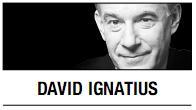WASHINGTON ― If you’re wondering what diplomats can do in an era of pulverizing military force and instantaneous communications, consider the case of Robert Ford, the U.S. ambassador to Syria. He has been meeting with the Syrian opposition around the country, risking his neck ― and in the process infuriating the regime of President Bashar al-Assad.

Ford is an example of the free-form diplomacy the U.S. will need as it pulls back its troops from the wars in Iraq and Afghanistan. He’s projecting American power quietly ― through counseling the protesters and networking ― rather than trying to wrap the opposition in the American flag, which would be the kiss of death for them.
I spoke with Ford by telephone recently, which for the moment is unfortunately the only way most U.S. journalists can talk to him. He outlined the basic advice he has offered in meetings with opposition leaders, which is to remain peaceful and resist the slide toward sectarian violence.
Ford summarizes his message this way: “Don’t be violent. That’s crucial. If you do that, you’re playing into the hands of the government.”
And yet, as Ford notes, sectarian killing “is certainly on the upswing” in Syria. It’s a frightening cycle of attack and retaliation, reminiscent of the Sunni versus Shiite mayhem that enveloped Iraq in 2006. The blood feud here is between Syria’s Sunni majority and the Alawite minority that has ruled since Assad’s father took power in 1970.
The reports are gruesome, from both sides: Syrian security forces are rounding up dissidents and torturing some of them. Opposition forces have engaged in reprisal killings. Western and Syrian government sources both say that soldiers who have been captured are sometimes decapitated, and even dismembered; a few Alawite captives had their eyes gouged out. Afraid of the spiraling violence, a Syrian “silent majority” ― composed of Sunni business leaders, Christians and some Alawites ― has stayed on the fence.
The protesters chant “peaceful, peaceful.” But Syrian and U.S. officials both confirm a recent report in the New York Times that Homs, a city in central Syria that has been a hotbed of protest, is veering toward civil war, with checkpoints demarcating the zones of conflict. (For a vivid on-scene description, look at the three-part series by American freelance journalist Nir Rosen on al-Jazeera’s website. He quotes a protester in Homs: “The West thinks we are Islamists because we come out of mosques, but it’s the only place people can gather.”)
Syrian militants have been claiming they are building a military wing, on the model of the Libyan revolution, and some even want a NATO no-fly zone. There’s Western speculation, too, that the Turkish army could create a Benghazi-like sanctuary along the northern border. But for now, such talk of armed struggle is mostly fantasy: Assad can still occupy any area in a day, if he needs to.
Ford’s mission has been to encourage the internal opposition to get its act together, politically. The two strongest groups of street protesters are known as the “Local Coordination Committees,” headed by a human rights lawyer named Razan Zeitouneh, and the “General Organization of the Syrian Revolution,” led by Suhair al-Atassi, the daughter of a prominent Syrian political family. The significant role of these women should help lessen Western worries that this movement is simply a creature of the Muslim Brotherhood.
What the Syrian opposition needs is political space in which to mature ― and develop a unified, nonviolent resistance to Assad. A U.N. Security Council resolution that might have provided monitors inside the county unfortunately was vetoed last week by Russia and China.
To meet the protesters, Ford has taken considerable personal risks. When he defied the government and bravely traveled to the embattled city of Hama in July, his vehicle was showered with roses by grateful protesters. But he was pelted with eggs and tomatoes by a pro-government mob when he visited an opposition leader in Damascus late last month. And the U.S. embassy itself was attacked by pro-government thugs in July.
Wherever he goes, Ford asks practical questions ― pressing the activists about incentives for Syrian business, or reforming the government budget. He counsels the embattled protesters against military action ― which would only bring on a vicious civil war. He thinks time works against Assad, if protesters can avoid the trap of sectarian conflict.
It’s a narrow ledge that Ford is walking. But it’s good to see an American diplomat in the lead for a change, instead of the U.S. military.
By David Ignatius
David Ignatius’ email address is davidignatius@washpost.com. ― Ed.
(Washington Post Writers Group)




![[Herald Interview] 'Trump will use tariffs as first line of defense for American manufacturing'](http://res.heraldm.com/phpwas/restmb_idxmake.php?idx=644&simg=/content/image/2024/11/26/20241126050017_0.jpg)

![[Health and care] Getting cancer young: Why cancer isn’t just an older person’s battle](http://res.heraldm.com/phpwas/restmb_idxmake.php?idx=644&simg=/content/image/2024/11/26/20241126050043_0.jpg)

